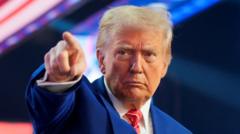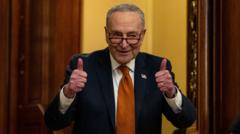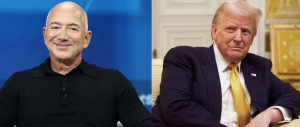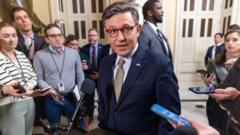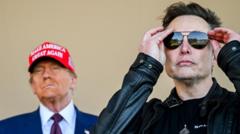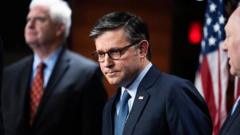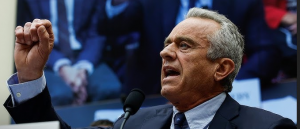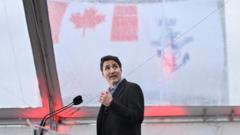As Javier Milei approaches the one-year mark as Argentina's President, his controversial economic policies are resonating with certain U.S. factions, particularly among small-government advocates. While he garners support from notable figures like Elon Musk and Donald Trump, analysts caution against drawing direct parallels due to the unique challenges faced by Argentina.
Argentina's Libertarian Shift: A Neoliberal Influence on the United States?
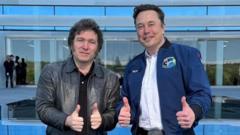
Argentina's Libertarian Shift: A Neoliberal Influence on the United States?
President Javier Milei's economic and political choices in Argentina are echoing in the United States, revealing ideological intersections and political divergence with figures like Trump and Musk.
As Argentina's libertarian leader Javier Milei celebrates nearly one year in office, his controversial economic policies are increasingly capturing the attention of political figures in the United States. His mission to overhaul a spiraling economy through drastic austerity measures has yielded mixed results, but it has inspired small-government advocates in the U.S., including high-profile supporters like Elon Musk and Donald Trump.
Milei's rise to power is rooted in cutting state expenditures in a nation financially strapped for years, where poverty rates continue to climb alongside inflation. Despite these challenges, a recent survey by CB Consultora indicates approximately half of Argentines still back Milei—a level of approval reminiscent of Donald Trump’s support base during his recent campaign. Trump, in particular, has lauded Milei as someone capable of revitalizing Argentina akin to his own "Make America Great Again" agenda.
Musk has similarly praised Milei's deregulation efforts, framing the situation in Argentina as a "giant improvement." Milei has enacted substantial cuts in state subsidies, reduced government ministries, and is pursuing a mass privatization policy, including the potential sale of Aerolineas Argentinas. These moves resonate well with Musk, who advocates for a significant reduction in federal regulations and government spending in the U.S.
However, experts are cautious about directly applying Milei's Argentine model to the U.S. economy. Monica de Bolle from the Peterson Institute emphasizes that Argentina's economic crisis stems from decades of public resource mismanagement, making it an exceptional case with little direct relevance to the American context. In contrast, Milei's severe cuts are a last resort, while U.S. political dynamics differ significantly.
Marcelo J. García from Horizon Engage warns that while aspiring to emulate Milei's bold stance may appeal to Musk and others, Trump's policies often demand a more significant governmental role, complicating any closer ideological alignment. Trump supports expansive initiatives that arguably contradict the minimalist governance Milei promotes.
On the trade front, while Milei supports free trade initiatives, he critiques the restrictive nature of regional trade agreements like Mercosur. He argues that such arrangements should facilitate greater trade and investment, diverging from Trump's more protectionist views regarding U.S. partnerships.
The ideological chasm is further highlighted in their differing approaches to governance. Milei's disdain for a large government is not universal; particularly when noting that Trump's political strategies often incorporate big governmental projects.
Moving forward, Milei's governance will face the ultimate test with Argentina's midterm elections set for October 2025, where the viability of his small-government policies will be on the line against a polarized electorate. As the U.S. prepares for a new political landscape, the implications of Milei's presidency on American politics remain to be fully seen, but his blend of libertarian zeal and divisive leadership presents particular challenges both at home and potentially abroad.

